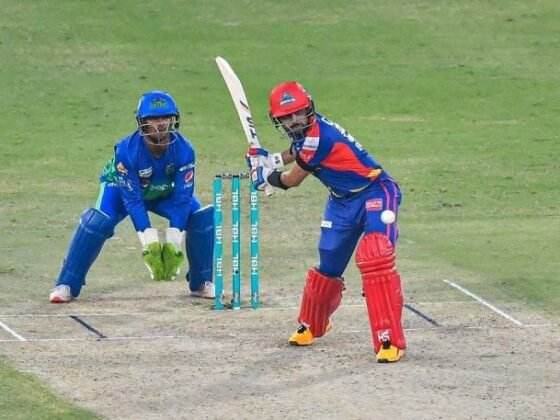Younis and Azhar dissect Australia
Younis Khan and Azhar Ali shepherded Pakistan to a dominant 304 for 2 on day one of the second Test in Abu Dhabi, where a confounded Australia’s thirst for wickets went almost totally unquenched.
In their quest for a first series victory over Australia in 20 years, Pakistan’s batsmen set down the most ideal platform possible, guided largely by the wonderfully correct and composed Younis, who became the first man to compile three consecutive centuries against Australia in 90 years.
It had seemed difficult to imagine that Australia’s bowlers could look more ineffective than they had done in Dubai, yet the Abu Dhabi surface offered them still less to work with, and the search for skills of spin and reverse swing remained a fruitless one. After Nathan Lyon and Mitchell Johnson struck either side of lunch, Younis and Azhar added an unbeaten 208.
Michael Clarke tried every conceivable field setting, from an array of catchers in front of the wicket on either side of the batsmen, to the rare posting of a man at straight hit, prompting Pakistani queries about the legality of a fielder standing directly behind the bowler.
But the bowlers and fielders alike were rendered mere extras by the orthodoxy of Younis. Azhar offered a half chance to David Warner at slip from the wrist spin of Steven Smith but even that was a worry for Australia – Smith’s turn and bounce is sure to perk up the interest of Yasir Shah. Clarke was reduced to bowling himself by the end, after the day had begun with news that the left-arm spin of Steve O’Keefe had been discarded.
The tour selectors Darren Lehman and Rod Marsh had made two highly aggressive changes to the team that lost by 221 runs in Dubai, dropping Alex Doolan and O’Keefe for Glenn Maxwell and Mitchell Starc.
The daredevil Maxwell is expected to bat at No. 3 after Doolan’s timid effort in the first Test, while Starc was included alongside Mitchell Johnson in the same XI for the first time since January 2013.
A win or draw in Abu Dhabi would deliver Pakistan their first Test series victory over Australia since a 1-0 home result in 1994, and the early exchanges suggested the second result may appear most likely. The pitch offered even less in the way of bounce or pace than Dubai’s had done, and there was no new ball swing for Mitchell Johnson to exploit.
Mohammad Hafeez and Ahmed Shehzad were thus able to wander along without much urgency or anything in the way of alarms against Johnson, Starc or Peter Siddle, the ball seldom beating the bat and no appeals being raised by the slip cordon.
It took the introduction of Lyon to draw the first significant false strokes of the morning when he was introduced after drinks. Shehzad propped forward to his second ball, which did not spin as expected and the thinnest of edges was missed by Brad Haddin as the batsmen took three.
Missed chances have been an unfortunate recurring theme of Lyon’s Test career, but this one was to prove less costly than others. Shehzad favoured the back foot after his earlier edge, and was pinned on the crease by the last ball of Lyon’s third over for a clear lbw.
Australian relief to have taken one wicket was to be their isolated moment of joy for the session, as Hafeez and Azhar pushed on dourly to lunch. The posting of short covers, mid-ons and mid-offs and even a rare man at straight hit by Clarke said as much about the pitch as the scoreboard.
Hafeez was fluent and collected, and seemed set for a half-century when Johnson angled a delivery past him and extracted a thin edge through to Haddin. Azhar and Younis made very few errors during the balance of the afternoon, and by the interval had set down a fine platform for the day and the match.
Having chosen an extra paceman in heat hovering around 36C all day, Australia’s over rate had been tardy, leaving 38 overs scheduled for a sapping final session. They would bowl only 36 before the umpires deemed the light to be fading, but in that time Younis and Azhar heaped 146 runs with only the slightest hints of trouble.
Younis’ century was reached in a mere 128 balls, summing up the escalation of his technical and mental mastery over the bowlers following his dogged wrestle with them on the first day of the series. Azhar’s took a far more circumspect 223 with only six fours – how Australia must wish for that kind of perseverance in their young batsmen.
Hours before at Cricket Australia’s AGM, the chief executive James Sutherland had confidently predicted an Australian turnaround in Abu Dhabi. It will need to happen quickly.









